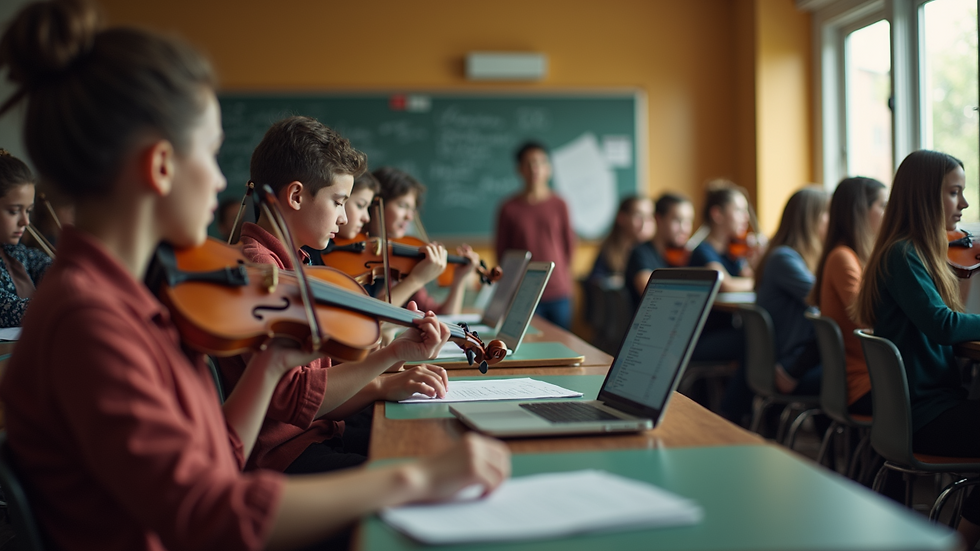Why Music Matters: The Lasting Benefits of Early Music Education
- Christie Dittmer

- Jun 16, 2025
- 3 min read
Music is so much more than background noise or entertainment. It’s a powerful, lifelong tool that shapes how children learn, grow, and connect with the world around them—starting even before birth! Research shows that babies respond to rhythm and melody in the womb, and that early exposure to music can support healthy brain development from day one.
Whether you’re singing lullabies, clapping to a beat, or exploring classical masterpieces with your child, music can open doors to emotional, social, and cognitive growth in meaningful ways.

Music Builds a Strong Learning Foundation
Music education plays a special role in early childhood. It’s not just about learning an instrument—it’s about nurturing creativity and supporting overall learning.
In fact, studies show that children who receive music instruction often perform better in subjects like math and reading. According to the Journal of Research in Music Education, kids involved in music programs tend to score higher on standardized tests than their peers who don’t engage with music regularly.
Why? Music helps children recognize patterns, strengthen memory, and process complex ideas—skills that support success across many academic areas.
More Than Notes: Music Teaches Life Skills
Music also brings kids together. Whether they’re singing in a group, keeping rhythm with a sibling, or playing a simple tune, music naturally encourages teamwork and communication. It’s a fun, hands-on way to build friendships and practice listening to others—skills that stick with them for life.
And while playing an instrument sharpens hand-eye coordination and motor skills, simply listening and responding to music builds attention and self-regulation—two essential ingredients for learning.
How Music Supports Brain Development
When children engage with music, their brains get a full workout. Learning rhythms, melodies, and lyrics helps improve memory, sequencing, and focus. Even singing along to a favorite tune helps with language development—kids pick up new words and phrases without even realizing it!
These early musical experiences help wire the brain for learning and build a strong foundation for reading, writing, and critical thinking.

The Big Picture: What Music Education Is Really About
At its heart, music education is about more than playing an instrument or reading notes. It’s about nurturing a deep, lasting appreciation for music and helping children discover a joyful, meaningful way to express themselves.
Music helps develop important character traits too—like patience, perseverance, and focus. Practicing a song or preparing for a performance teaches kids that growth takes time and effort, and that hard work pays off. These are lessons they’ll carry far beyond music.
Social & Emotional Growth Through Music
Music is a universal language—and that’s especially true for kids. It brings people together, helps children express emotions they may not have words for, and offers comfort during challenging times.
Whether it’s the thrill of performing in front of others, the quiet reflection of listening to a beautiful melody, or the laughter of singing silly songs together, music supports emotional well-being. It can also give kids a boost in confidence. Each new song mastered or stage performance completed helps them feel proud and brave.

Simple Ways to Bring Music into Your Child’s Day
You don’t need to be a musician to give your child the gift of music. Here are some easy ways to make music part of your homeschool or daily family rhythm:
Start early. Sing lullabies, play soothing background music, and explore different genres—even with babies.
Make it playful. Try rhythm games, hand-clapping songs, or play with simple instruments like shakers or drums.
Use music to teach. Turn lessons into songs—think alphabet songs, math rhymes, or memory jingles.
Attend live music. Whether it’s a symphony or a local student recital, live music is a great experience.
Create a music-friendly home. Let your child explore playlists, dance freely, and make up their own songs. Include a variety of musical styles in your home and encourage free, joyful, at-home performances including all the siblings who want to participate!
These small but meaningful moments can have a lasting impact.
Final Thoughts: A Joyful Journey Through Music
Music has the power to shape the way children think, feel, and relate to the world. By making it part of your child’s early education, you’re nurturing creativity, confidence, and curiosity—skills that help them thrive in learning and life.
Whether you’re exploring music through structured lessons or spontaneous singalongs, the important thing is simply to start. The benefits are rich, rewarding, and lifelong.
And if you're ready to bring more music into your middle- or high-schooler's homeschool journey, remember that the MusicIQ courses are here to help make music history and appreciation easy, beautiful, and enriching for families—no instruments required.



Comments